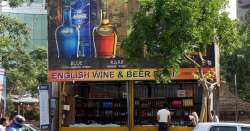How states are trying to ‘bypass’ SC’s ‘highway liquor ban’ order
Stumped by the Supreme Court’s ban on liquor shops within 500 metres of national and state highways coming effective April 1, several state governments are now considering options to get around the apex court’s order fearing huge revenue loss.

Stumped by the Supreme Court’s ban on liquor shops within 500 metres of national and state highways coming effective April 1, several state governments are now considering options to get around the apex court’s order fearing huge revenue loss.
The Centre, on its part, is looking to strike a balance. Union Tourism minister Mahesh Sharma said yesterday that the Centre will hold discussions on the matter and see how a solution can be found so that the tourism industry doesn’t take a hit while the SC directive is also followed.
Sharma clarified that the matter was a state subject and any decision on this can only be taken by the state governments concerned. However, sources said that the Centre could seek a fresh legal opinion from the Attorney General on the matter.
“We will refer to the states the problems being faced by the hotel and restaurant owners due to the ban. It is for them (state governments) to take necessary action,” Sharma said.
The states are faced with a perilous situation. On one hand is the SC order which needs to be implemented and on the other is the huge loss of revenue and jobs that the move will cost. Flummoxed, state governments are looking to find a way around the apex court’s order.
Denotifying highways appears to be coming across as the most preferred option for several states hit by the ban. According to officials, a state has the powers to denotify the state highways within cities and towns in the state, although it needs to approach the Centre for national highways.
Hoping to diminish the impact of ban on liquor sale along national and state highways, the state administrations of Rajasthan, Madhya Pradesh, Uttar Pradesh and the Union Territory of Chandigarh have reportedly begun denotifying state highways and declare them as ‘roads’.
The Rajasthan government is reportedly trying to denotify State Highways to Urban roads to bypass SC’s liquor ban order. Around 2800 liquor shops situated near the national and state highways in Rajasthan are affected by the Supreme Court order.
"Nearly 2,800 shops in Rajasthan were affected by the Supreme court order. Most of the shops have been shifted to other place from their highway location and remaining few were closed because of non-availability of suitable location," Excise Commissioner O P Yadav told Times Of India.
Meanwhile, the Chandigarh administration has become the first to actually go ahead and issue a notification to converts the national and state highways into major district roads. The decision will pave way for all liquor shops along the highways in Chandigarh to remain operational. According to the notification of Chandigarh Administration's Engineering Department issued on Thursday, all the V-1, V-2, V-3 roads have been declared as major district roads with immediate effect except National Highway No 21.
States such as Andhra Pradesh, Telangana, Goa, Maharashtra, Punjab and UP are also exploring the exoring the option of denotifiying state highways falling within cities and towns, turning them into urban roads. In Pune, for instance, the district administration said that a proposal has been sent to the state government to denotify the highways within the city limits and a decision on this awaited.
While some states have said they would like to negotiate with the central government, Kerala has said it is planning to seek time from court to implement the order. The Telangana government too wants the deadline for closure to be extended until September end. There are about 1,400 vends and bars in the state, located within 500 metres from highways.
The Goa government, however, hasn’t renewed the licences of over 2,500 liquor shops that were close to the highways
According to an industry body estimate, the collective revenue loss from the ban could amount up to Rs 50,000 crore. States which are dependent on tourism are the worst hit. These include Goa, Rajasthan, and union territories of Daman and Diu.
Tamil Nadu, whose revenue depends mainly on taxes from liquor sales, has estimated losses of Rs 2,100 crore due to the closure of nearly 1,000 liquor shops.
The apex court had on December 15 banned all liquor shops on national as well as state highways across the country and directed that licenses of existing shops should not be renewed after March 31.
